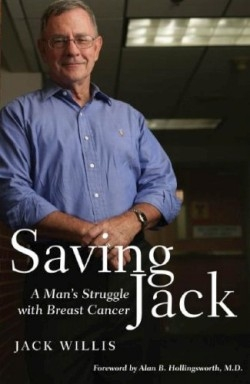Saving Jack
A Man's Struggle with Breast Cancer
Men handle disease quite sensibly. We avoid discussing it, minimize the exchange when avoidance fails, and try to forget about it as soon as possible. Trusted sources report that women actually ask each other about their life-threatening illnesses and offer encouragement. Checking into the notion that talk could yield benefits, a journalism professor in his sixties diagnosed with breast cancer sometimes felt like the odd duck out at support meetings, but he found it undeniably easier to talk to women than men about his situation.
His account moves from diagnosis to mastectomy with few missed work days, and a minimum of complaints. The tone becomes serious and self-examination ramps up as the effects of chemotherapy make the memoirist question for the first time his fortitude to carry on the fight to exist. Later, a course of radiation treatments follow, and finally a strange new status as a survivor.
Willis projects a Regular Guy demeanor, a good fit for the Haggard tune “Okie From Muskogee.” He served as editor of the Phoenix newspaper there from the seventies into the nineties, and recently retired as faculty advisor for the Oklahoma Daily, O.U.‘s college paper. You might see him at Wal-Mart, Home Depot, at the American Cancer Society’s Relay For Life; this politically moderate mainstream everyman notices how tall the neighbors’ lawns are. He’s not crass, but not opaque either, weighing in on the issues men truly stress over: “ …I didn’t need Viagra, if you know what I mean.” Body functions and malfunctions are mentioned to show that there shouldn’t be shame from effects piled on top of the fear of demise.
The memoirist lauds efforts of a loving family, and is surprised at the numerous other survivors who come out of the woodwork now to introduce themselves. Though never opposed to religion, the trials of chemotherapy led to daily prayers of gratitude and greater reflection. Willis didn’t dramatically transform—he was already steady and mild, he but came to feel a spiritual connection and sensed strength on loan. He said, “…I knew God and I had help fighting the battle.”
Jack Willis’s story of breast cancer treatment and side effects attaches only a modicum of importance to gender, because he didn’t feel much stigma. Saving Jack is intended for a diagnosis-specific niche group who have next to no firsthand accounts from a male survivor to reassure themselves with. The book does speak to that constituency with frankness regarding changing drives and emotional control, but the memoirist’s insights from treatment’s peaks and valleys can be helpful to male patients of any form of cancer. There is a better way than silent isolation; sharing that message is a service in itself.
Reviewed by
Todd Mercer
Disclosure: This article is not an endorsement, but a review. The publisher of this book provided free copies of the book to have their book reviewed by a professional reviewer. No fee was paid by the publisher for this review. Foreword Reviews only recommends books that we love. Foreword Magazine, Inc. is disclosing this in accordance with the Federal Trade Commission’s 16 CFR, Part 255.

